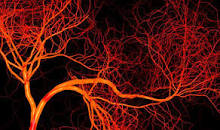Leave a Comment:
1 comment
[…] Colorectal Cancer-Angiogenesis Inhibitors […]
Reply
Learn about conventional, complementary, and integrative therapies.
Dealing with treatment side effects? Learn about evidence-based therapies to alleviate your symptoms.
Click the orange button to the right to learn more.

The article linked and excerpted below quotes several oncologists making the case for anti-angiogenic chemotherapy drugs such as Bevacizumab (avastin), a potent angiogenesis inhibitor- for the treatment of colorectal cancer.
Unfortunately, avastin is expensive, causes side effects and will stop working eventually.
What if you could add non-toxic anti-angiogenic therapies to your regimen? This idea isn’t radical or even that new. There is a great deal of research that establishes the anti-angiogenic (and anti-cancer) properties of curcumin for example. When I happened on Dr. Bill Li’s Ted Talk in 2010 a whole new world opened up to me.
Among other non-toxic anti-angiogenic therapies that I follow daily, weekly, etc. I supplement with Life Extension Super Bio-Curcumin and have been since about 2006. And my incurable blood cancer has remained in complete remission in all that time. I chose to take LE Super Bio-Curcumin because of it’s efficacy and because it has been evaluated and approved by Consumerlab.com, an independent testing organization.
According to research, curcumin may enhance the efficacy of avastin in colorectal cancer.
I am both a long term cancer survivor and cancer coach. If you have been diagnosed with colorectal cancer consider both conventional (FDA approved) and evidence-based non-conventional anti-angiogenic therapies.
To Learn More about Angiogenesis and Cancer- click now
Thank you,
Recommended Reading:
“An angiogenesis inhibitor is a substance that inhibits the growth of new blood vessels (angiogenesis). Some angiogenesis inhibitors are endogenous and a normal part of the body’s control and others are obtained exogenously through pharmaceutical drugs or diet.
Angiogenesis inhibitors were once thought to have potential as a “silver bullet” treatment applicable to many types of cancer, but the limitations of anti-angiogenic therapy have been shown in practice.[1] Nonetheless, inhibitors are used to effectively treat cancer…
Through binding to VEGFR and other VEGF receptors in endothelial cells, VEGF can trigger multiple cellular responses like promoting cell survival, preventing apoptosis, and remodeling cytoskeleton, all of which promote angiogenesis. Bevacizumab (brand name Avastin) traps VEGF in the blood, lowering the binding of VEGF to its receptors. This results in reduced activation of the angiogenesis pathway, thus inhibiting new blood vessel formation in tumors.[7]
After a series of clinical trials in 2004, Avastin was approved by the FDA, becoming the first commercially available anti-angiogenesis drug. FDA approval of Avastin for breast cancer treatment was later revoked on November 18, 2011.[36]“
“Oncologists have a variety of medicines they can use to treat cancer. Each drug works in a different way, so doctors often give patients different types of drug at the same time to deliver a one-two blow to tumors. One type of drug used in metastatic cancer helps prevent the development of new blood vessels that feed tumors, a process called angiogenesis…
What Is Angiogenesis?
Angiogenesis is a normally balanced, biological process whereby our body develops new blood vessels as needed to deliver nutrients and oxygen and to eliminate metabolic waste and carbon dioxide. In cancer, however, tumors hijack this process for their own benefit.
“Angiogenesis happens during cancer formation, growth and – most importantly – spread,” says Dr. Davendra Sohal, an oncologist at the Cleveland Clinic. “Tumors need a blood supply to grow so they require new blood vessels. The native blood supply is insufficient, so angiogenesis is stimulated by the cancer itself for its own growth.”
Anti-angiogenesis medicines help control the process of new blood vessel development, Sohal says. They choke the blood supply to the cancer, preventing it from getting blood and nutrients…
[These drugs] don’t work for everyone,” Landau says. They work well in certain cancers, but not in others (for example, breast cancer). They can also wear off as time goes on. In the case of kidney cancers, Landau says, once you block one pathway for developing blood vessels, the tumor learns to develop others…Chemotherapy and anti-angiogenesis drugs can’t cure metastatic cancer or prevent recurrence; they can only help prolong survival. “Cancer is a smart animal,” Sohal says. “It can find ways to fight back.” When patients develop resistance to chemotherapy, it’s time to change to a different chemotherapy drug, he says. “We’ll continue to use angiogenesis drugs as long as we have another chemotherapy option. However, by themselves, anti-angiogenesis drugs don’t do a whole lot.”
[…] Colorectal Cancer-Angiogenesis Inhibitors […]
Reply